(完整word版)吴伟仁--英国文学史及选读--名词解释
吴伟仁《英国文学史及选读》(重排版)笔记和考研真题详解-弗吉尼亚·伍尔芙【圣才出品】
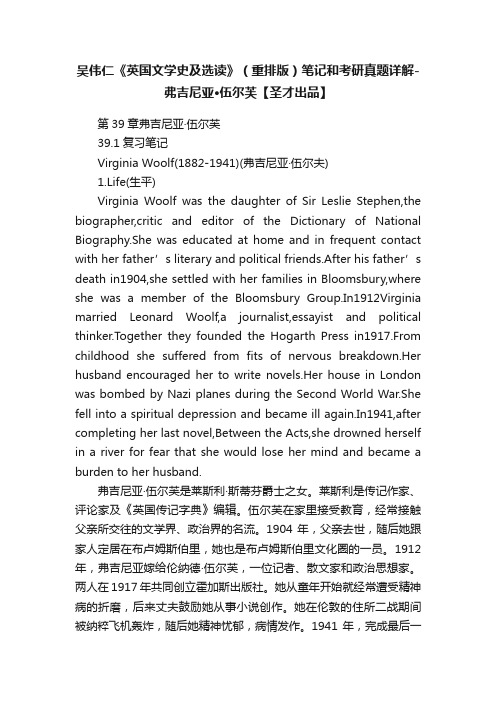
吴伟仁《英国文学史及选读》(重排版)笔记和考研真题详解-弗吉尼亚·伍尔芙【圣才出品】第39章弗吉尼亚·伍尔芙39.1复习笔记Virginia Woolf(1882-1941)(弗吉尼亚·伍尔夫)1.Life(生平)Virginia Woolf was the daughter of Sir Leslie Stephen,the biographer,critic and editor of the Dictionary of National Biography.She was educated at home and in frequent contact with her father’s literary and political friends.After his father’s death in1904,she settled with her families in Bloomsbury,where she was a member of the Bloomsbury Group.In1912Virginia married Leonard Woolf,a journalist,essayist and political thinker.Together they founded the Hogarth Press in1917.From childhood she suffered from fits of nervous breakdown.Her husband encouraged her to write novels.Her house in London was bombed by Nazi planes during the Second World War.She fell into a spiritual depression and became ill again.In1941,after completing her last novel,Between the Acts,she drowned herself in a river for fear that she would lose her mind and became a burden to her husband.弗吉尼亚·伍尔芙是莱斯利·斯蒂芬爵士之女。
吴伟仁《英国文学史及选读》笔记和考研真题详解-第7章浪漫主义时期【圣才出品】

吴伟仁《英国⽂学史及选读》笔记和考研真题详解-第7章浪漫主义时期【圣才出品】第7章浪漫主义时期7.1 复习笔记I. Background Knowledge(背景知识)At the turn of the 18th and 19th centuries, romanticism appeared in England as a new trend in literature. It rose and grew under the impetus of the Industrial Revolution and French Revolution.Romanticism prevailed in England during the period 1798-1832. The co-authored book Lyrical Ballads published in 1798 by the poets William Wordsworth and Samuel Taylor Coleridge marked the beginning of romanticism, while the death of Walter Scott in 1832 declared the ending of it.18世纪末19世纪初,在英国⼯业⾰命和法国⼤⾰命的影响下,浪漫主义成为⼀种新的⽂学思潮应运⽽⽣。
1798年华兹华斯和柯勒律治共同编写的《抒情歌谣集》标志浪漫主义时期的开始,1832年沃尔特·司各特的去世则宣告浪漫主义时期的结束。
II. Literary Features of the Eighteenth Century(⼗⼋世纪⽂学特征)1. The Romantic Period is one of poetical revival. It is a period of poetry. Emotion, imagination and intuition of humankind are what the romanticists emphasize in their works. The general feature of the works of the romanticists is the dissatisfaction with the bourgeois society. They pay more attention to thespiritual and emotional life of man. Nature plays an important role in their works.2. Romantic poets are generally divided into two groups: the elder generation, or the escapist romanticists (Wordsworth, Coleridge and Southey, who also known as Lake Poets), and the younger generation, or the active romanticists (Byran, Shelley and Keats). The elder generation reflected the merry of old England. Frightened by the coming of industrialism and the nightmare towns, they were turning to nature for protection. The younger generation expressed the aspirations of the classes created by capitalism and held out an ideal of a future society free from oppression and exploitation.3. Romantic prose of the time was represented by Lamb, Hazlitt, De Quincey andHunt.4. The only great novelist in this period was Walter Scott, whose historical novelscombined a romance atmosphere with a realistic depiction of historical background and common people’s life. Scott marked the transition from romanticism to the period of realism.1. 浪漫主义时期是诗歌复兴时期。
吴伟仁《英国文学史及选读》(重排版)笔记和考研真题详解-乔纳森

吴伟仁《英国文学史及选读》(重排版)笔记和考研真题详解-乔纳森第11章乔纳森?斯威夫特11.1复习笔记Jonathan Swift(1667-1745)(乔纳森·斯威夫特)1.Life(生平)Jonathan Swift was a satirist,essayist,political pamphleteer,poet and cleric.He was born of poor English parents in Dublin.At Dublin University,he detested the curriculum,reading only what appealed to his own nature.After graduation,he worked for a distant relative,Sir William Temple,a statesman and diplomat.He spent ten best years of his life in Moor Park,where he read and studied widely.Well aware of his literary superiority and unbearable of his being looked down upon,Swift left his patron,entered the Church of England,and later settled in a little church in Ireland.Then he gradually developed his satiric talent,gave up his church to enter the strife of party politics.He became a dictator in the literature /doc/b02148420.html,ter he became the Dean of St.Patrick’s Cathedral in Dublin,where he stayed with the Irish in their fight for improving their lot.Swift had been afflicted from his earliest youth with a brain disease which caused him intense pain.Finally his disease ended in madness,and after suffering great pain,he died in utter misery in1745.In his will,he bequeathed all his property to the building of a madhouse in Dublin.It is now still there,called“Dr.Swift’s Madhouse”.乔纳森·斯威夫特是一位讽刺作家、散文家、政治宣传者,诗人和圣职人员。
吴伟仁《英国文学史及选读》(重排版)笔记和考研真题详解-约翰·弥尔顿【圣才出品】

吴伟仁《英国文学史及选读》(重排版)笔记和考研真题详解-约翰·弥尔顿【圣才出品】第8章约翰·弥尔顿8.1复习笔记John Milton(1608-1674)(约翰·弥尔顿)1.Life(生平)John Milton was born into a pious wealthy Puritan family.He was greatly influenced by his father who loved books and had a private teacher for him.About12years old,Milton was sent to a famous boy’s school in London called St Paul’s;at15,he went to Cambridge University where he was said to be the finest scholar.Abandoning the thought of being a clergyman of the English Church,he retired to his father’s country house at Horton,writing poetry and studying hard. Later he traveled France,Switzerland and Italy where he heard that people’s struggle against the king might lead to war.After he returned to London,he wrote pamphlets opposing the monarchy and advocating people’s liberty.The commonwealth government gave Milton the important office of Secretary for Foreign Tongues.He worked hard and finally became blind.During the Restoration,he was thrown in prison and released by CharlesⅡ.He died on November8,1674surrounded by a few devoted friends.弥尔顿出生在富裕、虔诚的清教徒家庭。
(完整word版)英国文学_名词解释_【整理后】

1.epic 史诗:a long narrative poem,grand in style,about heroes and heroic deeds, embodyingheroic ideals of a nation or race in the making. Beowulf is the English national epic that was passed from mouth to mouth and written down by many unknown hands.2.Conceit:a kind of metaphor that makes a comparison between two startlinglydifferent things. A conceit usually provides the framework for an entire poem。
An especially unusual and intellectual kind of conceit is the metaphysical conceit,used by certain 17th-century poets, such as John Donne.。
3.Epiphany(顿悟):a sudden revelation of truth about life inspired by a seeminglytrivial incident4.Metaphysical poetry:玄学诗派the poetry of John Donne and other 17th-centurypoets who wrote in a similar style。
It is characterized by verbal wit and excess, ingenious structure, irregular meter,colloquial language, elaborate imagery,anda drawing together of dissimilar ideas 。
吴伟仁《英国文学史及选读》(重排版)笔记和考研真题详解

读书笔记模板
01 思维导图
03 精彩摘录 05 作者介绍
目录
02 内容摘要 04 目录分析 06 读书笔记
思维导图
关键字分析思维导图
真题
复习
吴伟仁
教材
第章
难点
时期
笔记
笔记
章节 题
托马斯
真题
典型
笛福
笔记
丹尼尔
真题
阶段
内容摘要
作为该教材的学习辅导书,全书完全遵循该教材的章目编排,共分为七部分,总共40章,每章由两部分组成: 第一部分为复习笔记(中英文对照),总结本章的重点难点;第二部分是考研真题与典型题详解,精选名校近年 考研真题及相关习题,并提供了详细的参考答案。本书具有以下几个方面的特点:1.梳理章节脉络,浓缩内容精 华。每章的复习笔记以该教材为主并结合其他教材对本章的重难点知识进行了整理,并参考了国内名校名师讲授 该教材的课堂笔记,因此,本书的内容几乎浓缩了经典教材的知识精华。2.中英双语对照,凸显难点要点。本书 章节笔记采用了中英文对照的形式,强化对重要难点知识的理解和运用。3.精选考研真题,补充难点习题。本书 精选名校近年考研真题及相关习题,并提供答案和详解。所选真题和习题基本体现了各个章节的考点和难点,但 又不完全局限于教材内容,是对教材内容极好的补充。
目录分析
第1章盎格鲁-撒克逊 时期
第2章盎格鲁-诺曼底 时期
第3章杰弗里•乔叟 第4章大众民谣
1.1复习笔记 1.2考研真题与典型题详解
2.1复习笔记 2.2考研真题与典型题详解
3.1复习笔记 3.2考研真题与典型题详解
4.1复习笔记 4.2考研真题与典型题详解
(完整word版)英国文学史复习资料(吴伟仁版上册)

英国文学史复习资料(上册)★《贝奥武夫》Beowulf 它体现的是英雄叙事长诗,完成于公元九世纪。
全诗长3183行,以斯堪的纳维亚(Scandinavia)的英雄贝奥武夫(Beowulf)的英勇事迹构成主要内容。
勇士贝奥武甫与怪物格伦德尔搏斗,使其断臂而死。
怪物之母为子复仇,又被他追踪杀死。
后来他做了国王。
一次火龙来犯,他挺身斩龙,伤重而死,人民为他举行了隆重的葬礼。
本诗以西撒克斯(Wessex)方言写成,押头韵而不押尾韵,用双字隐喻而不用明喻。
是现存古英语文学中最古老的作品,是流传至今的欧洲最完整的一部史诗,也是欧洲最早的方言史诗。
在语言学方面也是相当珍贵的文献。
(安格鲁-撒克逊时期)★《高文爵士与绿衣骑士》Sir Gawain and the Green Knight是英语韵文浪漫诗的杰出代表。
全诗共2529行,作者不详,创作于诺曼时期向新时代过渡的14世纪它的题材属于亚瑟王和圆桌骑士的传说系列。
作品以巨大的艺术表现力反映了骑士制度的理想,是中世纪封建贵族文化的精髓。
在艺术上,此诗语言优美含蓄,情节完整紧凑,人物性格细腻丰满,诗中对大自然的精确而富于魅力的描写尤为引人注目,代表了中古英格兰北部头韵体诗歌艺术的最高成就。
(安格鲁-罗马时期)★杰弗雷·乔叟(Geoffrey Chaucer,约1343~1400)率先采用伦敦方言写作,并创作“英雄双行体”,对英国民族语言和文学的发展影响极大,故被誉为“英国诗歌之父”。
代表作《坎特伯雷故事集》Canterbury Tales,描写一群香客(pilgrim)聚集在伦敦一家小旅店里,准备去坎特伯雷城朝圣。
店主人建议香客们在往返途中各讲两个故事,看谁讲的最好。
故事集包括了23个故事,其中最精彩的故事有:骑士讲的爱情悲剧故事、巴斯妇讲的骑士的故事、卖赎罪券者讲的劝世寓言故事、教士讲的动物寓言故事、商人讲的家庭纠纷的故事、农民讲的感人的爱情和慷慨义气行为的故事。
吴伟仁《英国文学史及选读》(重排版)笔记和考研真题详解-理查德
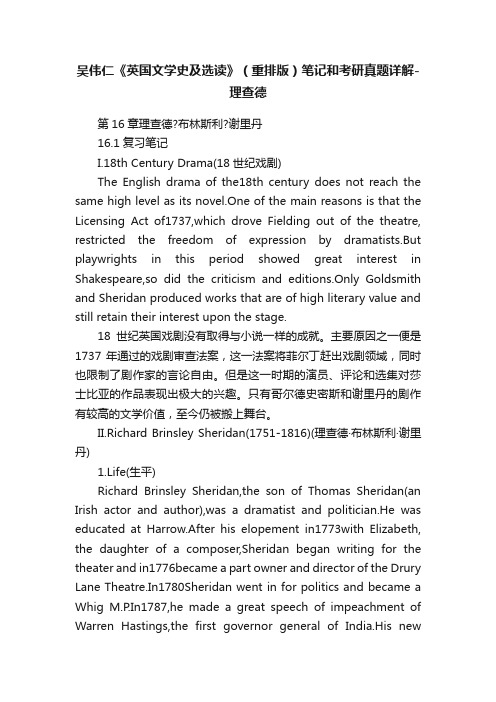
吴伟仁《英国文学史及选读》(重排版)笔记和考研真题详解-理查德第16章理查德?布林斯利?谢里丹16.1复习笔记I.18th Century Drama(18世纪戏剧)The English drama of the18th century does not reach the same high level as its novel.One of the main reasons is that the Licensing Act of1737,which drove Fielding out of the theatre, restricted the freedom of expression by dramatists.But playwrights in this period showed great interest in Shakespeare,so did the criticism and editions.Only Goldsmith and Sheridan produced works that are of high literary value and still retain their interest upon the stage.18世纪英国戏剧没有取得与小说一样的成就。
主要原因之一便是1737年通过的戏剧审查法案,这一法案将菲尔丁赶出戏剧领域,同时也限制了剧作家的言论自由。
但是这一时期的演员、评论和选集对莎士比亚的作品表现出极大的兴趣。
只有哥尔德史密斯和谢里丹的剧作有较高的文学价值,至今仍被搬上舞台。
II.Richard Brinsley Sheridan(1751-1816)(理查德·布林斯利·谢里丹)1.Life(生平)Richard Brinsley Sheridan,the son of Thomas Sheridan(an Irish actor and author),was a dramatist and politician.He was educated at Harrow.After his elopement in1773with Elizabeth, the daughter of a composer,Sheridan began writing for the theater and in1776became a part owner and director of the Drury Lane Theatre.In1780Sheridan went in for politics and became a Whig M.P.In1787,he made a great speech of impeachment of Warren Hastings,the first governor general of India.His newtheatre was opened in1794,but destroyed by fire in1809.He was arrested for debt in1813and in his last years suffered from brain disease.He died in1816 and was buried with a great pomp in Westminster Abbey.His plays are generally considered as important links between the masterpieces of Shakespeare and those of Bernard Shaw.理查德·布林斯利·谢里丹是爱尔兰演员和作者托马斯·谢里丹之子,是一名戏剧家和政治家。
吴伟仁《英国文学史及选读》(重排版)笔记和考研真题详解-约翰·高尔斯华绥【圣才出品】
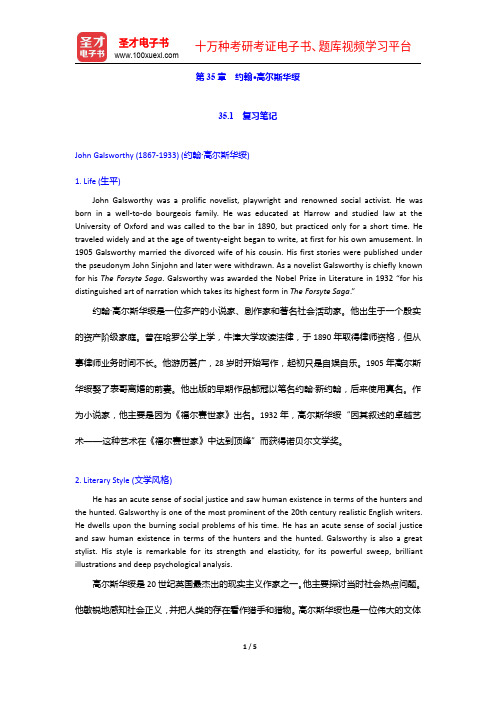
第35章约翰·高尔斯华绥35.1复习笔记John Galsworthy(1867-1933)(约翰·高尔斯华绥)1.Life(生平)John Galsworthy was a prolific novelist,playwright and renowned social activist.He was born in a well-to-do bourgeois family.He was educated at Harrow and studied law at the University of Oxford and was called to the bar in1890,but practiced only for a short time.He traveled widely and at the age of twenty-eight began to write,at first for his own amusement.In 1905Galsworthy married the divorced wife of his cousin.His first stories were published under the pseudonym John Sinjohn and later were withdrawn.As a novelist Galsworthy is chiefly known for his The Forsyte Saga.Galsworthy was awarded the Nobel Prize in Literature in1932“for his distinguished art of narration which takes its highest form in The Forsyte Saga.”约翰·高尔斯华绥是一位多产的小说家、剧作家和著名社会活动家。
吴伟仁《英国文学史及选读》(重排版)笔记和考研真题详解-丹尼尔
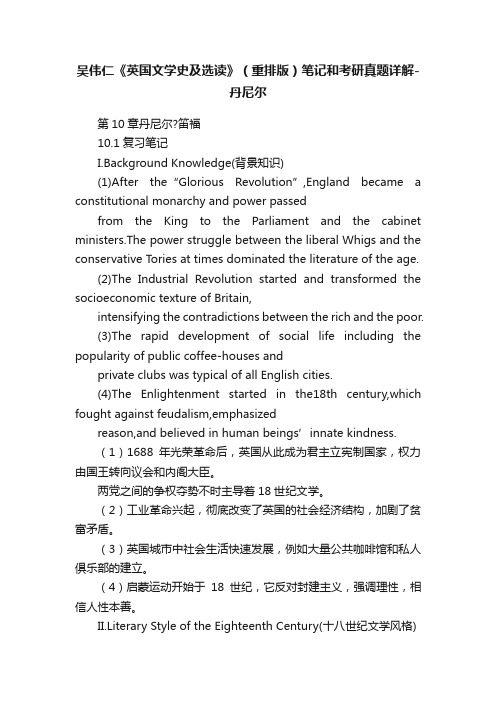
吴伟仁《英国文学史及选读》(重排版)笔记和考研真题详解-丹尼尔第10章丹尼尔?笛福10.1复习笔记I.Background Knowledge(背景知识)(1)After the“Glorious Revolution”,England became a constitutional monarchy and power passedfrom the King to the Parliament and the cabinet ministers.The power struggle between the liberal Whigs and the conservative Tories at times dominated the literature of the age.(2)The Industrial Revolution started and transformed the socioeconomic texture of Britain,intensifying the contradictions between the rich and the poor.(3)The rapid development of social life including the popularity of public coffee-houses andprivate clubs was typical of all English cities.(4)The Enlightenment started in the18th century,which fought against feudalism,emphasizedreason,and believed in human beings’innate kindness.(1)1688年光荣革命后,英国从此成为君主立宪制国家,权力由国王转向议会和内阁大臣。
(完整word版)英国文学 名词解释

1.(1) Modernism (现代主义)A movement of experiment in new techniques in writing. Modernist fic tion represented a trend drifting away from the tradition of the 19th century realism。
It put emphasis on the description ogoometimes it is called modern psychological fiction. Lawrence is a typical representative of itRealism(现实主义)Realism was a loosely used term meaning truth to the observed facts of life (especially when they are gloomy)。
Realism in literature is an approach that attempts to describe life without idealization or romantic subjectivity。
Realism现实主义: An elastic and ambiguous term with two meanings。
(1) First, it refers generally to any artistic or literary portrayal of life in a faithful, accurate manner, unclouded by false ideals, literary conventions, or misplaced aesthetic glorification and beautification of the world。
吴伟仁--英国文学史及选读--名词解释(word文档良心出品)
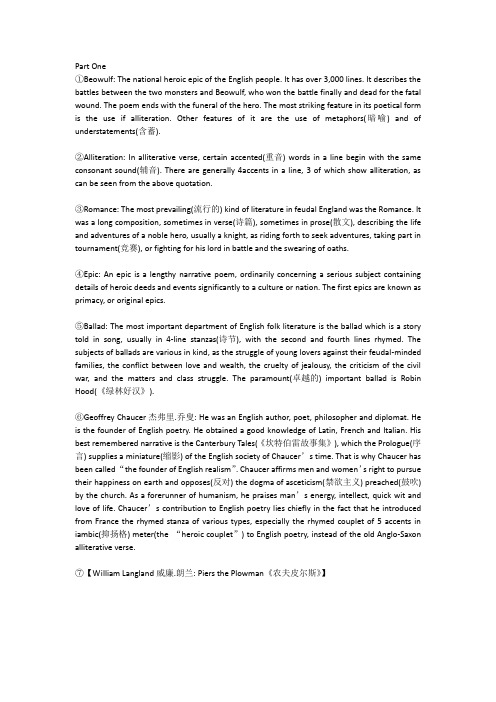
①Beowulf: The national heroic epic of the English people. It has over 3,000 lines. It describes the battles between the two monsters and Beowulf, who won the battle finally and dead for the fatal wound. The poem ends with the funeral of the hero. The most striking feature in its poetical form is the use if alliteration. Other features of it are the use of metaphors(暗喻) and of understatements(含蓄).②Alliteration: In alliterative verse, certain accented(重音) words in a line begin with the same consonant sound(辅音). There are generally 4accents in a line, 3 of which show alliteration, as can be seen from the above quotation.③Romance: The most prevailing(流行的) kind of literature in feudal England was the Romance. It was a long composition, sometimes in verse(诗篇), sometimes in prose(散文), describing the life and adventures of a noble hero, usually a knight, as riding forth to seek adventures, taking part in tournament(竞赛), or fighting for his lord in battle and the swearing of oaths.④Epic: An epic is a lengthy narrative poem, ordinarily concerning a serious subject containing details of heroic deeds and events significantly to a culture or nation. The first epics are known as primacy, or original epics.⑤Ballad: The most important department of English folk literature is the ballad which is a story told in song, usually in 4-line stanzas(诗节), with the second and fourth lines rhymed. The subjects of ballads are various in kind, as the struggle of young lovers against their feudal-minded families, the conflict between love and wealth, the cruelty of jealousy, the criticism of the civil war, and the matters and class struggle. The paramount(卓越的) important ballad is Robin Hood(《绿林好汉》).⑥Geoffrey Chaucer杰弗里.乔叟: He was an English author, poet, philosopher and diplomat. He is the founder of English poetry. He obtained a good knowledge of Latin, French and Italian. His best remembered narrative is the Canterbury Tales(《坎特伯雷故事集》), which the Prologue(序言) supplies a miniature(缩影) of the English society of Chaucer’s time. That is why Chaucer has been called “the founder of English realism”. Chaucer affirms men and women’s right to pursue their happiness on earth and opposes(反对) the dogma of asceticism(禁欲主义) preached(鼓吹) by the church. As a forerunner of humanism, he praises man’s energy, intellect, quick wit and love of life. Chaucer’s contribution to English poetry lies chiefly in the fact that he introduced from France the rhymed stanza of various types, especially the rhymed couplet of 5 accents in iambic(抑扬格) meter(the “heroic couplet”) to English poetry, instead of the old Anglo-Saxon alliterative verse.⑦【William Langland威廉.朗兰: Piers the Plowman《农夫皮尔斯》】The English Bible: The first complete English Bible was translated by John Wycliffe(约翰?威克里夫). The Authorized Version is King James Bible made in 1611. The result is a monument of English language and English literature.Renaissance: Renaissance or the birth of letters is an intellectual movement. Its two features are a thirsting curiosity for the classical literature and the keen interest in the activities of humanity. Humanism is the key-note of the Renaissance.William Caxton威廉.卡克斯顿: He is the first English printer and invented in England the profession of publisher.Thomas More托马斯.莫尔: The greatest of the English humanists was Thomas More, the author of Utopia《乌托邦》. He is also one of such “giants”(巨匠) of the Renaissance. He distinguished himself as a learned scholar, a master of Latin, a witty talker, a lover of music, an honest statesman , and a man of noble character, modest but steadfast(坚定的), to his convictions. He was a far-sighted thinker, aspired for a totally new society with happy, classless, and free from poverty and exploitation. He was one of the forerunners of modern socialist thought.Utopia: It is More’s masterpiece, written in the form of a conservation between More and Hythloday, a returned voyager. It is divided into two books. The first book contains a long discussion on the social conditions of England. In the second book is described in detail an ideal communist society, Utopia. The name “Utopia”comes from Greek words meaning “no place”and was adopted by More as the name of his ideal commonwealth.Philip Sidney菲利普.锡德尼: He is well-known as a poet and critic of poetry. His collection of love sonnets, Astrophel and Stella《爱星者与星》, was published in 1591.Edmund Spenser埃德蒙.斯宾塞(莎翁之前最杰出的英国诗人):The poet’s poet of the period was ES who was buried beside Chaucer in Westminster Abbey. ES has held his position as a model of poetical art among the Renaissance English poets, and his influence can be traced in the works of Milton, Shelley, and Keats. ES is the first master to make that language the natural music of his poetic effusions(感情的流露). His sonnets in Amoretti, together with Sidney’s Astrophel and Stella and Shakespeare’s sonnets ,are the most famous sonnet sequences of the Elizabeth Age. 【In 1579 he wrote The Shepherd’s Calendar《牧人日记》which marked the budding(萌芽) of the Renaissance flower in the northern island of England. The faerie Queen 《仙后》is his greatest work which was dedicated to Queen Elizabeth.】Francis Bacon: He is the founder of English materialist philosophy and the founder of modern science in England. His New Instrument is called the Inductive Method of reasoning. He is also the first English essayist. To give a few, “Men fear death as children fear to go in the dark..”“Studies serve for delight.”“Reading makes a full man; conference a ready man; and writing an exact man.”Drama: The Miracle Play圣迹剧The Morality Play道德剧寓意剧The Interlude幕间节目Christopher Marlowe克里斯托弗.马洛: The most gifted of the “university wits”was Christopher Marlowe. His best work include 3 of his plays, Tamburlaine《帖木儿大帝》(1587), The Jew of Malta《马耳岛的犹太人》(1592), and Doctor Faustus《浮士德博士》(1588). He was the greatest of the pioneers of English drama. His work paved the way for the plays of the greatest English dramatist——Shakespeare——whose achievements were the monument of the English Renaissance.【His plays show the spirit of the rising bourgeoisie, its eager curiosity for knowledge, its towering pride, its insatiable(不知足的) appetite for power won by military, might, knowledge, or gold. The theme of his plays is the praise of individuality freed from the restraints of medieval dogmas and law, and the conviction of the boundless possibility of human efforts in conquering the universe. The heroes in his plays are merely individualists, their individualistic ambition often brings ruin to the world and sometimes to themselves.】William Shakespeare: Shakespeare is one of the founders of realism in world literature. His dramatic creation often used the method of adaptation(改革). Shakespeare long experience with the stage and his intimate knowledge of dramatic art thus acquired make him a master hand for playwriting. Shakespeare was skilled in many poetic forms: the song, the sonnet, the couplet, and the dramatic blank verse. He was especially at home with the blank verse. Shakespeare was a great master of the English language. Shakespeare has been universally acknowledged to be the summit of the English Renaissance, and one of the greatest writers over the world.①The great comedies: A Midsummer Might’s Dream, The Merchant of Venice, As You Like It, Twelfth Night.②The great tragedies: Hamlet, Othello, King Lear, Macbeth.The Merchant of Venice: 威尼斯富商安东尼奥Antonio为了成全好友巴萨尼奥Bassanio的婚事,向犹太人高利贷者夏洛克Shylock借债。
吴伟仁《英国文学史及选读》(重排版)笔记和考研真题详解-简·奥斯汀【圣才出品】
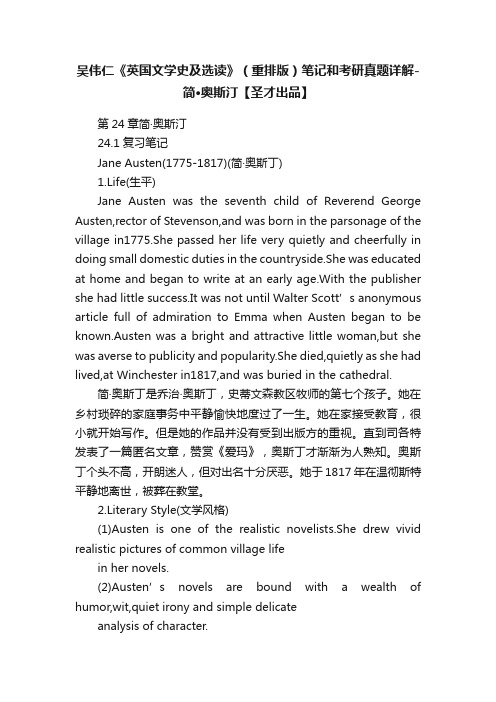
吴伟仁《英国文学史及选读》(重排版)笔记和考研真题详解-简·奥斯汀【圣才出品】第24章简·奥斯汀24.1复习笔记Jane Austen(1775-1817)(简·奥斯丁)1.Life(生平)Jane Austen was the seventh child of Reverend George Austen,rector of Stevenson,and was born in the parsonage of the village in1775.She passed her life very quietly and cheerfully in doing small domestic duties in the countryside.She was educated at home and began to write at an early age.With the publisher she had little success.It was n ot until Walter Scott’s anonymous article full of admiration to Emma when Austen began to be known.Austen was a bright and attractive little woman,but she was averse to publicity and popularity.She died,quietly as she had lived,at Winchester in1817,and was buried in the cathedral.简·奥斯丁是乔治·奥斯丁,史蒂文森教区牧师的第七个孩子。
她在乡村琐碎的家庭事务中平静愉快地度过了一生。
她在家接受教育,很小就开始写作。
但是她的作品并没有受到出版方的重视。
吴伟仁《英国文学史及选读》(重排版)笔记和考研真题详解-杰弗里

吴伟仁《英国⽂学史及选读》(重排版)笔记和考研真题详解-杰弗⾥第3章杰弗⾥?乔叟3.1复习笔记Geoffrey Chaucer(1340-1400)(杰弗⾥·乔叟)1.Life(⽣平)Geoffrey Chaucer,born in or about1343in London,is the“father of English poetry”and one of the greatest narrative poets of England.He was the son of a prosperous merchant,and later became a courtier and comptroller.Chaucer’s learning was wide in scope.He obtained a good knowledge of Latin,French and Italian.He had broad and intimate acquaintance with persons high and low in all walks of life,and knew well the whole life of his time,which left great impressions upon his works and particularly upon his variegated depiction of the English society of his time.He died in1400and was buried in Westminster Abbey,thus founding the“Poets’Corner”.杰弗⾥·乔叟于1343年(或1343年左右)出⽣于伦敦,他被誉为“英国诗歌之⽗”,也是英国最伟⼤的叙事诗⼈之⼀。
他是富商之⼦,之后⼜当了朝⾂和审计官。
完整版英国文学史 名词解释

名词解释3.4.works. This tendency is known as Neoclassicism.5. Sentimentalism : it was one of the important trends in English literature of the laterdecades of the 18th century. It concentrated on the free expression of thoughts and emotions, and presented a new view of human nature which prized feeling over thinking, passion over reason. 6. Romanticism : imagination, emotion and freedom are certainly the focal points ofromanticism. The particular characteristics of the literature of romanticism include:subjectivity and an emphasis on individualism; freedom from rules; solitary life rather then life in society; the beliefs that imagination is superior to reason; and love of and worship of nature.7. Lake Poets : the English poets who lived in and drew inspiration from the Lake District at the beginning of the 19 th century.8. Byronic Heroes : a variant of the Romantic heroes as a type of character( enthusiasm,persistence, pursuing freedom), named after the English Romantic Poet Gordon Byron. 9.Realism : seeks to portray familiar characters, situations, and settings in a realistic manner. This is done primarily by using an objective narrative point of view and through the buildup of accurate detail.10. Aestheticism : an art movement supporting the emphasis of aesthetic values more than socio-political themes for literature, fine art, music and other arts.11. Stream-of-Consciousness : it is a literary technique that presents the thoughts andfeelings of a character as they occur without any clarification by the author. It is a narrative mode.12. Dramatic Monologue : a kind of narrative poem in which one character speaks to one or more listeners whose replies are not given in the poem.13. Iambic Pentameter : a poetic line consisting of five verse feet, with each foot an unstressed syllable followed by a stressed syllable, that is, with each foot an iamb.14. Epic: a long narrative poem telling about the deeds of a great hero and reflecting the values of the society from which it originated.15. Elegy : a poem of mourning, usually over the death of an individual; may also be a lament over the passing of life and beauty or a meditation of the nature of death; a type of lyric poem.16. Canto : a section of a long poem. The cantos can be a great poem17. Ode: a complex and often lengthy lyric poem, written in a dignified formal style on some lofty or serious subjects. Odes are written for a special occasion, to honor a person or a Heroic Couplet : a couplet consisting of two rhymed lines of iambic pentameter, and written in an elevated style.1. Renaissance : a revival or rebirth of the artistic and scientific revival which originated in Italy in the 14th century and gradually spread all over Europe. It has two features: athirsting curiosity for the classical literature and keen interest in activities of humanity.Sonnet : 14-line lyric poem, usually written in rhymed iambic pentameter. Blank verse : poetry written in unrhymed iambic pentameter.Neoclassicism : the Enlightenment brought about a revival of interest in Greek and Roman 2.season or to commemorate an event.Spenserian Stanza : a nine-line stanza made up of 8 lines of iambic pentameter ending with an Alexandrine. Its thyme scheme is ababbcbcc. This stanza was common to travel literature. 18.Metrical Pattern : a lyric poem of five 14-lined stanzas containing four tercets and a closing couplet. The rhyme scheme is aba bcb cdc ded ee.文学史中古时期I.Beowulf《贝奥武甫》:the natural epic of the English people; Denmark story, alliteration, meta phor, un derstateme nts2.Sir Gawai n and Green Kni ght 《高文爵士和绿衣骑士》3.Geoffrey Chaucer (杰弗里乔叟):the Father of English Poetry; The Canterbury Tales 《埃特伯雷故事集》(24stories) 文艺复兴时期1.Thomas More : Utopia《乌托邦》-the com muni cati on betwee n more and the traveler which just came back from Utopia.2.Francis Bacon: the first English Essayist; Essays《随笔集》- Of Studies, Of Truth (p hilos op hical and literary works)3.Thus Wyatt : first to introduce the sonnet into English literature.4.Edmund Spenser : Poet's poet; The Fairy Queen《仙后》(to Queen Elizabeth I)5.William Shakespeare :Sonnet 18(Shall I compare thee to a summer's day) 17世纪英国文学IJohn Donne : the leadi ng poet of Meta physical school of p oetry; A Valedict ion: Forbidd ing Mourning《分离:莫忧伤》2.John Milton : Paradise Lost《失乐园》 (a revolt against God's authority), Paradise Regained 《复乐园》 (how Christ overcame Santa) ----- stories were taken from Bible3.John Bunyan : the son of Renaissanee; Pilgrim's Progress《天路历程》(imagination, shadow ing, realistic religious allegory) 18世纪英国文学Novel:1.the age of reas on, classicism, sen time ntalism and roma nticism (no vels, p rose, dramas, po etry)2.Daniel Defoe : representative of English realistic novel; Robinson Crusoe 《鲁滨逊漂流记》(the deve lopment of a young man from a n aive and artless youth to a clever and harde ned man)3.Jon atha n Swift: G ulliver's Travels 《格列佛游记》(ficti on al, satirical- huma n n ature, theEuropean Government, the differe nces betwee n religi ons, whole En glish state system)4.Henry Fielding : the Father of English novel; The History of Tome Jones, a Foundling《汤姆琼斯》,satiricPo etry:5.Thomas Gray : Elegy Written in a Country Churchyard 《墓园挽歌》6.Alexander Pope : perfected in heroic coupiet; An Essay on Criticism 《论批评》7.William Blake : pre-romantic; Songs of Innonce《天真之歌》, Songs of Experienee《经验之歌》-London, The Tiger8.Robert Burns : A Red Red Rose《一朵红红的玫瑰》Drama:9.Richard Brinsley Sheridan_:Master of Comedy of mann ers;The School for Scan dal《造谣学校》浪漫主义时期1798-1832I.William Wordsworth : the Lake Poets; The Prelude《序曲》;I Wondered Lonely as a Cloud《我似流云天自游》;The Solitary Reaper《孤寂的割麦女》;features: poet of nature and human heart 2.Samuel Taylor Coleridge : the first critic of the Romantic school; The Rime of the Ancient Mariner《古舟子咏》3.George Gordon Byro n : vigorous, strong and beautiful; Childe Harold's Pilgrimage 《恰尔德哈罗尔德游记》(spenserian stanza, fights for liberty); Don Juan 《唐璜》(a broad critical picture of European life); When We Two Parted《昔日依依别》;She Walks in Beauty《她走在美的光影中》;The Isles of Greece《哀希腊》4.Percy Bysshe Shelley : Ode to the West Wind《西风颂》-赞颂西风,希望与其紧密相连;Prometheus Unbound《解放了的普罗米修斯》(the victory for man's struggle against tyranny andopp ressi on)5.John Keats : sen suous, colorful and rich in imagery; Ode to a Night in gale 《夜莺颂》;Ode on a Grecian Urn《希腊古瓮颂》6.Walter Scott : Father of Historical Novel; combine historical fact and romantic imagination7.Jane Austen : wit, dry humour, subtle irony,realistic; Pride and Prejudice 《傲慢与偏见》(Elizabeth and Darcy) ;Sense and Sensibility《理智与情感》;Emma《爱玛》8.Charles Lamb : Poor Relations《穷亲戚》;Dream-children《童年梦幻》;A Reverie《幻想曲》维多利亚时期1.summit: realistic novel2.Charles Dicke ns : critical realist writer; humour, wit, happy endin gs; A Tale of Two Cities 《双城记》(London & Paris, where there is oppression, there is revolution); David Copperfield 《大卫科波菲尔》;Oliver Twist《雾都孤儿》;Hard Time《艰难时世》;Great Expectations《远大前程》;Dombey and Son《董贝父子》;Pickwick Papers《匹克威克外传》3.William Make peace Thackeray : Van ity Fair《名利场》(to satirize the social more, decade neeand corrup ti on of his time; to criticize the values measured by wealth)4.George Eliot : no velist, her no vels are celebrated for their realism and p sychological in sights;Adam Bede《亚当比德》(social in equality) ;The Mill on the Floss《弗洛斯河上的磨坊》;Silas Marner《织工马南》5.Alfred Tennyson : succeeded Wordsworth as Poet Laureate in 1850; Break, Break, Break《扌白吧, 拍吧,拍吧》;Crossing the Bar《过沙洲》6.Robert Browning : dramatic monologues; My Last Duchess《我已故的公爵夫人》7.The Bronte Sisters :Charlotte: Jane Eyre 《简爱》:简爱是一个心地纯洁、善于思考的女性, 她生活在社会底层,受尽磨难。
英国文学名词解释大全(整理版)(K12教育文档)

(完整)英国文学名词解释大全(整理版)(word版可编辑修改)编辑整理:尊敬的读者朋友们:这里是精品文档编辑中心,本文档内容是由我和我的同事精心编辑整理后发布的,发布之前我们对文中内容进行仔细校对,但是难免会有疏漏的地方,但是任然希望((完整)英国文学名词解释大全(整理版)(word版可编辑修改))的内容能够给您的工作和学习带来便利。
同时也真诚的希望收到您的建议和反馈,这将是我们进步的源泉,前进的动力。
本文可编辑可修改,如果觉得对您有帮助请收藏以便随时查阅,最后祝您生活愉快业绩进步,以下为(完整)英国文学名词解释大全(整理版)(word版可编辑修改)的全部内容。
名词解释1.Epic(史诗)(appeared in the the Anglo-Saxon Period )It is a narrative of heroic action, often with a principal hero, usually mythical in its content, grand in its style, offering inspiration and ennoblement within a particular culture or national tradition。
A long narrative poem telling about the deeds of great hero and reflecting the values of the society from which it originated.Epic is an extended narrative poem in elevated or dignified language, like Homer's Iliad& Odyssey。
It usually celebrates the feats of one or more legendary or traditional heroes。
英国文学史名词解释(吴伟仁)

英国文学史名词解释(仅供参考)1. Iambic pentameterIambic pentameter is a commonly used metrical line in traditional verse and verse drama. The term describes the particular rhythm that the words establish in that line. That rhythm is measured in small groups of syllables; these small groups of syllables are called "feet". The word "iambic" describes the type of foot that is used (in English, an unstressed syllable followed by a stressed syllable). The word "pentameter" indicates that a line has five of these "feet."2. Stream of consciousnessStream of consciousness is a narrative mode that seeks to portray an individual's point of view by giving the written equivalent of the character's thought processes, either in a loose interior monologue, or in connection to his or her actions.Stream-of-consciousness writing is usually regarded as a special form of interior monologue and is characterized by associative leaps in syntax and punctuation that can make the prose difficult to follow.3. HumanismHumanism is a literary and philosophical view emphasizing humankind as its center concerns. Humanism originated in the Renaissance, the term has been used many ways, but always suggests humanity as the central concern, with the natural world (science) and the spiritual world (religion) valued for their relation to people.4. RomanticismRoughly the first third of the 19th century makes up English literature’s romantic period. Writers of romantic literature are more concerned with imagination and feeling than with the power of reason. A volume of poems called Lyrical Ballads written by William Wordsworth and Samuel Taylor Coleridge is regarded as the romantic poetry’s “Declaration of Independence.” Keats, Byron and Shelley, the three great poets, brought the Romantic Movement to its height. The spirit of romanticism also occurred in the novel.5. Critical RealismCritical Realism is the main trend of the literary thoughts in the late 19th century. It reveals the corrupting influence of the rule of cash upon human nature. Critical realists first and foremost set themselves the task of criticizing capitalist society from a democratic viewpoint of bourgeoisie reality. As far as the literary form or “genre” is concerned, the major contribution made by the 19th century critical realists lies in their perfection of the novels. Like the realists of the 18th century, the 19th century critical realists made use of the form of novel for full and detailed representations of social and political events, and of the fate of individuals and of whole social classes.6. ModernismModernism refers to a form of literature mainly written before WWII. It is characterized by a high degree of experimentation. It can be seen as a reaction against the 19th century forms of Realism. Modernist writers express the difficulty they see in understanding and communicating how the world works. Often, Modernist writing seems disorganized, hard to understand. It often portrays the action from the viewpoint of a single confused individual, rather than from the viewpoint of an all-knowing impersonal narrator out side the action. One of the most famous English modernist writers is Virginia Woolf.7.EpicEpic is a long narrative poem, grand in style, about heroes and heroic deeds, embodying heroic ideals of a nation or race in the making. Beowulf is the English national epic that was passed from mouth to mouth and written down by many unknown hands.8.SonnetA fourteen-line lyric poem, usually written in rhymed iambic pentameter. There are generally three types of sonnets: the Petrarchan sonnet, the Spenserian Sonnet and the Shakespearean sonnet. The Shakespearean sonnet consists of 3 quatrains and one couplet.The three quatrains are devoted to the different aspects of one subject, paralleling in structure. The concluding couplet is actually the summary or comments made by the poet.9. Free VerseFree verse means the rhymed or unrhymed poetry composed without paying attention to conventional rules of meter. Free verse was originated by a group of French poets of the late 19th century. Their purpose was to free themselves from the restrictions of formal metrical patterns and to recreate instead the free rhythms of natural spee ch. Walt Whitman’s leaves of grass is, perhaps, the most notable example.10.Blank VerseUnrhymed iambic pentameter, the most widely used of English verse forms and usually used in English dramatic and epic poetry. William Shakespeare's play Hamlet is written in blank verse.11. Dramatic monologueDramatic monologue is a kind of poem in which a single fictional or historical character other than the poet speaks to a silent ''audience'' of one or more persons. Such poems reveal not the poet's own thoughts but the mind of the impersonated character, whose personality is revealed while the implied presence of an auditor distinguishes it from a soliloquy, have also been called Dramatic monologue. But to avoid confusion it is preferable to refer to these simply as monologues or as monodramas. Robert Browning's My Last Duchess is a case in point.。
- 1、下载文档前请自行甄别文档内容的完整性,平台不提供额外的编辑、内容补充、找答案等附加服务。
- 2、"仅部分预览"的文档,不可在线预览部分如存在完整性等问题,可反馈申请退款(可完整预览的文档不适用该条件!)。
- 3、如文档侵犯您的权益,请联系客服反馈,我们会尽快为您处理(人工客服工作时间:9:00-18:30)。
①Beowulf: The national heroic epic of the English people. It has over 3,000 lines. It describes the battles between the two monsters and Beowulf, who won the battle finally and dead for the fatal wound. The poem ends with the funeral of the hero. The most striking feature in its poetical form is the use if alliteration. Other features of it are the use of metaphors(暗喻) and of understatements(含蓄).②Alliteration: In alliterative verse, certain accented(重音) words in a line begin with the same consonant sound(辅音). There are generally 4accents in a line, 3 of which show alliteration, as can be seen from the above quotation.③Romance: The most prevailing(流行的) kind of literature in feudal England was the Romance. It was a long composition, sometimes in verse(诗篇), sometimes in prose(散文), describing the life and adventures of a noble hero, usually a knight, as riding forth to seek adventures, taking part in tournament(竞赛), or fighting for his lord in battle and the swearing of oaths.④Epic: An epic is a lengthy narrative poem, ordinarily concerning a serious subject containing details of heroic deeds and events significantly to a culture or nation. The first epics are known as primacy, or original epics.⑤Ballad: The most important department of English folk literature is the ballad which is a story told in song, usually in 4-line stanzas(诗节), with the second and fourth lines rhymed. The subjects of ballads are various in kind, as the struggle of young lovers against their feudal-minded families, the conflict between love and wealth, the cruelty of jealousy, the criticism of the civil war, and the matters and class struggle. The paramount(卓越的) important ballad is Robin Hood(《绿林好汉》).⑥Geoffrey Chaucer杰弗里.乔叟: He was an English author, poet, philosopher and diplomat. He is the founder of English poetry. He obtained a good knowledge of Latin, French and Italian. His best remembered narrative is the Canterbury Tales(《坎特伯雷故事集》), which the Prologue(序言) supplies a miniature(缩影) of the English society of Chaucer’s time. That is why Chaucer has been called “the founder of English realism”. Chaucer affirms men and women’s right to pursue their happiness on earth and opposes(反对) the dogma of asceticism(禁欲主义) preached(鼓吹) by the church. As a forerunner of humanism, he praises man’s energy, intellect, quick wit and love of life. Chaucer’s contribution to English poetry lies chiefly in the fact that he introduced from France the rhymed stanza of various types, especially the rhymed couplet of 5 accents in iambic(抑扬格) meter(the “heroic couplet”) to English poetry, instead of the old Anglo-Saxon alliterative verse.⑦【William Langland威廉.朗兰: Piers the Plowman《农夫皮尔斯》】The English Bible: The first complete English Bible was translated by John Wycliffe(约翰?威克里夫). The Authorized Version is King James Bible made in 1611. The result is a monument of English language and English literature.Renaissance: Renaissance or the birth of letters is an intellectual movement. Its two features are a thirsting curiosity for the classical literature and the keen interest in the activities of humanity. Humanism is the key-note of the Renaissance.William Caxton威廉.卡克斯顿: He is the first English printer and invented in England the profession of publisher.Thomas More托马斯.莫尔: The greatest of the English humanists was Thomas More, the author of Utopia《乌托邦》. He is also one of such “giants”(巨匠) of the Renaissance. He distinguished himself as a learned scholar, a master of Latin, a witty talker, a lover of music, an honest statesman , and a man of noble character, modest but steadfast(坚定的), to his convictions. He was a far-sighted thinker, aspired for a totally new society with happy, classless, and free from poverty and exploitation. He was one of the forerunners of modern socialist thought.Utopia: It is More’s masterpiece, written in the form of a conservation between More and Hythloday, a returned voyager. It is divided into two books. The first book contains a long discussion on the social conditions of England. In the second book is described in detail an ideal communist society, Utopia. The name “Utopia”comes from Greek words meaning “no place”and was adopted by More as the name of his ideal commonwealth.Philip Sidney菲利普.锡德尼: He is well-known as a poet and critic of poetry. His collection of love sonnets, Astrophel and Stella《爱星者与星》, was published in 1591.Edmund Spenser埃德蒙.斯宾塞(莎翁之前最杰出的英国诗人):The poet’s poet of the period was ES who was buried beside Chaucer in Westminster Abbey. ES has held his position as a model of poetical art among the Renaissance English poets, and his influence can be traced in the works of Milton, Shelley, and Keats. ES is the first master to make that language the natural music of his poetic effusions(感情的流露). His sonnets in Amoretti, together with Sidney’s Astrophel and Stella and Shakespeare’s sonnets ,are the most famous sonnet sequences of the Elizabeth Age. 【In 1579 he wrote The Shepherd’s Calendar《牧人日记》which marked the budding(萌芽) of the Renaissance flower in the northern island of England. The faerie Queen 《仙后》is his greatest work which was dedicated to Queen Elizabeth.】Francis Bacon: He is the founder of English materialist philosophy and the founder of modern science in England. His New Instrument is called the Inductive Method of reasoning. He is also the first English essayist. To give a few, “Men fear death as children fear to go in the dark..”“Studies serve for delight.”“Reading makes a full man; conference a ready man; and writing an exact man.”Drama: The Miracle Play圣迹剧The Morality Play道德剧寓意剧The Interlude幕间节目Christopher Marlowe克里斯托弗.马洛: The most gifted of the “university wits”was Christopher Marlowe. His best work include 3 of his plays, Tamburlaine《帖木儿大帝》(1587), The Jew of Malta《马耳岛的犹太人》(1592), and Doctor Faustus《浮士德博士》(1588). He was the greatest of the pioneers of English drama. His work paved the way for the plays of the greatest English dramatist——Shakespeare——whose achievements were the monument of the English Renaissance.【His plays show the spirit of the rising bourgeoisie, its eager curiosity for knowledge, its towering pride, its insatiable(不知足的) appetite for power won by military, might, knowledge, or gold. The theme of his plays is the praise of individuality freed from the restraints of medieval dogmas and law, and the conviction of the boundless possibility of human efforts in conquering the universe. The heroes in his plays are merely individualists, their individualistic ambition often brings ruin to the world and sometimes to themselves.】William Shakespeare: Shakespeare is one of the founders of realism in world literature. His dramatic creation often used the method of adaptation(改革). Shakespeare long experience with the stage and his intimate knowledge of dramatic art thus acquired make him a master hand for playwriting. Shakespeare was skilled in many poetic forms: the song, the sonnet, the couplet, and the dramatic blank verse. He was especially at home with the blank verse. Shakespeare was a great master of the English language. Shakespeare has been universally acknowledged to be the summit of the English Renaissance, and one of the greatest writers over the world.①The great comedies: A Midsummer Might’s Dream, The Merchant of Venice, As You Like It, Twelfth Night.②The great tragedies: Hamlet, Othello, King Lear, Macbeth.The Merchant of Venice: 威尼斯富商安东尼奥Antonio为了成全好友巴萨尼奥Bassanio的婚事,向犹太人高利贷者夏洛克Shylock借债。
